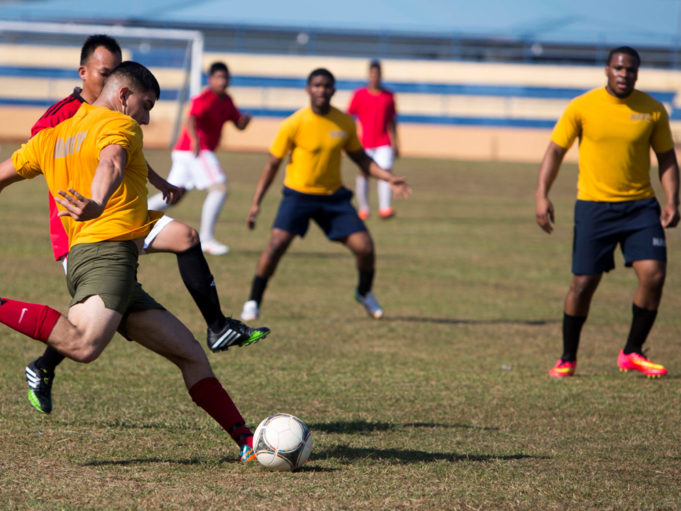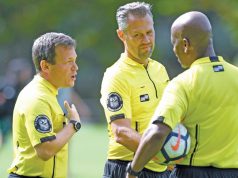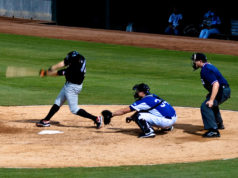By John Kiernan
Frequently I am asked to officiate scrimmages. There are great opportunities for an official during those matches. However, there are also pitfalls that one needs to be aware of when officiating any non-sanctioned match.
A little advice that MLS referee Kevin Stott offered: He said regardless of the game — if a match is sanctioned or not — there is someone at every game for whom that particular game is very important. That could mean a new player trying out for a club or it could be the first time a relative gets to see their child play. It could be a new goalkeeper trying out or it could be the 18th player on the team getting five minutes at the end of the game to try to prove him- or herself. That game may be just a scrimmage to you, but keep in mind that the game could be very important for a variety of reasons to a variety of people.
Focus on the positives of officiating a scrimmage. For officials, it is an opportunity to work on every aspect of your game. Arriving early allows you to view the teams’ warmups — beneficial because it allows officials to see who the playmakers might be even before play begins. Another benefit is that coaches often want to work on set plays, corner kicks, dead-ball fouls, penalty kicks, etc. That is a great opportunity for officials to work on positioning, player and touchline management. Further, many times I work solo on scrimmages, which allows me to focus on positioning, anticipation of play and fitness. If I am lucky enough to have an additional referee for a high school scrimmage, we focus on the dual-system mechanics. I often choose to officiate a game where I do not speak a word — a great opportunity to work on player communication on a different level. The possibility of being paid anything at all can be an unexpected bonus.
Former FIFA referee and National Assessor Arturo Angeles once told me that acceptance is the greatest tool referees have in their toolbox. Unless one already has a rapport with the coaches and players, that could be a troublesome area in a scrimmage. You are building your rapport during that very scrimmage. How will you deal with misconduct? Will the players and coaches accept your authority? Do the players have numbers on their jerseys and if not, how will you deal with misconduct or bookings?
There is need for ground rules. I meet with the coaches before the match and we establish ground rules for the scrimmage, such as a five-minute sit-out for any yellow cards issued. How will the officials know if they have already issued a card if players do not have jersey numbers? What if a fight breaks out? The official cannot write a credible report. In that instance, a phone call to the club president will usually help the official but that is after the fact.
As a high school coach, I frequently set up scrimmages against teams who are not in the same league, age range or even the same sex. My girls’ team has played boys, college teams, upper-division high school teams and gold or silver elite teams. That is great for the teams to get a feel for different levels and different styles of play.
However, those match-ups present an entirely new set of issues that a referee has to deal with before the match even begins. What Laws will be applied? NFHS, NCAA or USSF? Is there a sit-out period for bookings as there is in California NFHS play? What will be the time length of the game? How about substitutions? How will you call fouls when boys are playing girls? Will you apply the same principles as one would in a same-sex match? 50/50 balls are often a point of contention that in a coed game may have to be called differently than in a same-sex game.
Those are all issues that should be agreed upon by coaches before the very first touch on the ball. The best situation is for those matters to be agreed upon by both coaches via email before gameday. Print out those communications and review with the coaches before kickoff. Here is some advice: When teams cannot agree with each other, go with the younger players’ times and rules.
Finally, if you still believe that there are friendlies, next time the U.S. Men’s National Team plays the Mexican National team in a “friendly,” watch how “friendly” that game is! You might very well take that same cautionary approach to the scrimmage you are about to work.
John Kiernan, Valencia, Calif., is a USSF State Referee and AYSO Referee Instructor (Region 678). He also referees indoor and high school soccer and is a tennis coach.
What's Your Call? Leave a Comment:
Note: This article is archival in nature. Rules, interpretations, mechanics, philosophies and other information may or may not be correct for the current year.
This article is the copyright of ©Referee Enterprises, Inc., and may not be republished in whole or in part online, in print or in any capacity without expressed written permission from Referee. The article is made available for educational use by individuals.


















